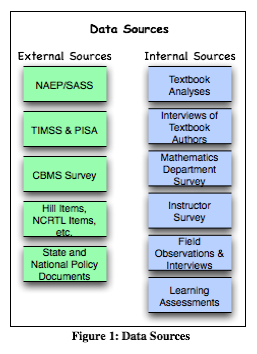Research Design
The research design for this study is explained in the following sections: background, conceptual framework, sites, surveys and assessments, and document analysis, each on a separate page linked from this page.
Background
The problem of teachers' mathematical knowledge has been a subject of research and policy for many years. While it is almost a truism to say that K-6 teachers' mathematical knowledge is inadequate, the problem is more complex than the simple assertion suggests. Fundamental questions of what mathematical knowledge is needed and how it can be taught and learned continue to demand attention, for improvement in K-6 students' mathematical achievement in the US lags in national and international assessments. Teachers' mathematical knowledge has been the subject of several recent policy documents (1) urging increased attention to our inadequate understanding of what teachers need to know and whether they know it.
A surprising aspect of this is how little we know about what prospective teachers are taught in their undergraduate mathematics education, what they have an opportunity to learn about the mathematics of elementary school. The Conference Board of the Mathematical Sciences (CBMS) conducts a survey every five years (the most recent results are from 2005) that provides some information about what courses are offered to future elementary teachers, but this summary data gives little information about the content or pedagogy of the classes.
In this study, we are learning more about the classes future teachers take with a long view toward helping institutions learn whether their courses are providing the mathematical knowledge teachers need. For the selected sites, we are investigating what content prospective elementary teachers have an opportunity to learn and whether they are learning that content.
The study is producing data about textbooks, courses, and instructor characteristics that may be useful at a practical level to institutions, departments, and instructors as they make critical decisions about what to teach and how to teach it. We are also producing assessments and protocols that may be useful to other researchers.
Data Sources
 |
The project is gathering data from several sources, both internal and external to the project as shown in Figure 1. The elements of the project are:
- Document analysis
- Textbooks
- Course materials
- State standards and assessments
- National standards and assessment
- Surveys of mathematics departments
- Surveys of instructors of mathematics classes for elementary teachers
- Surveys of prospective elementary teachers (students in the mathematics classes)
- Case studies of instructors teaching fractions to future elementary teachers
|
Other research pages: conceptual framework, sites, surveys and assessments, and document analysis
|